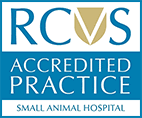There are a number of different heart diseases that can affect our cats; however, cardiomyopathy is the most common. But what is it and how do you know if your cat has it? We explore further below:
What is cardiomyopathy?
The term cardiomyopathy covers any disease that affects the heart muscle. There are different types of cardiomyopathies and they are classified according to the effect they have on the function of the heart muscle. The main ones are:
- hypertrophic cardiomyopathy (HCM)
most common form caused by increased thickness of the heart’s muscular wall, reducing blood volume and preventing heart muscle from relaxing between beats - dilated cardiomyopathy (DCM)
where the heart enlarges and the muscular wall becomes thinner, with the heart muscle unable to contract effectively - restrictive cardiomyopathy (RCM)
heart chambers are unable to fill normally due to the inelastic and stiff nature of the heart’s wall caused by fibrosis - intermediate cardiomyopathy (ICM)
where there are changes that are consistent with more than one of the disease classifications – e.g, signs of both hypertrophic and dilatation exist.
What are the signs a cat may have cardiomyopathy?
Symptoms of heart disease may not display easily. Therefore, it is important to ensure that your cat has regular check-ups with us so that any early signs of heart disease can be detected and treated accordingly. We may be able to pick up on:
- a heart murmur (listening to your cat’s heart using a stethoscope)
- a gallop rhythm (where an additional third beat is heard with each contraction cycle)
- increase or decrease in heart rate
There may be other signs that could indicate the onset of heart disease in your cat, including:
- breathing difficulties/rapid breathing
- cold extremities, suggesting poor circulation
- signs of fainting (although relatively uncommon)
If in any doubt, it is always best to get your cat seen by us. On detection of a heart murmur, there may be further tests required to confirm the diagnosis.
If you have any concerns about your cat, please get in touch. More information about cardiomyopathy can be found on the International Cat Care website, here.








